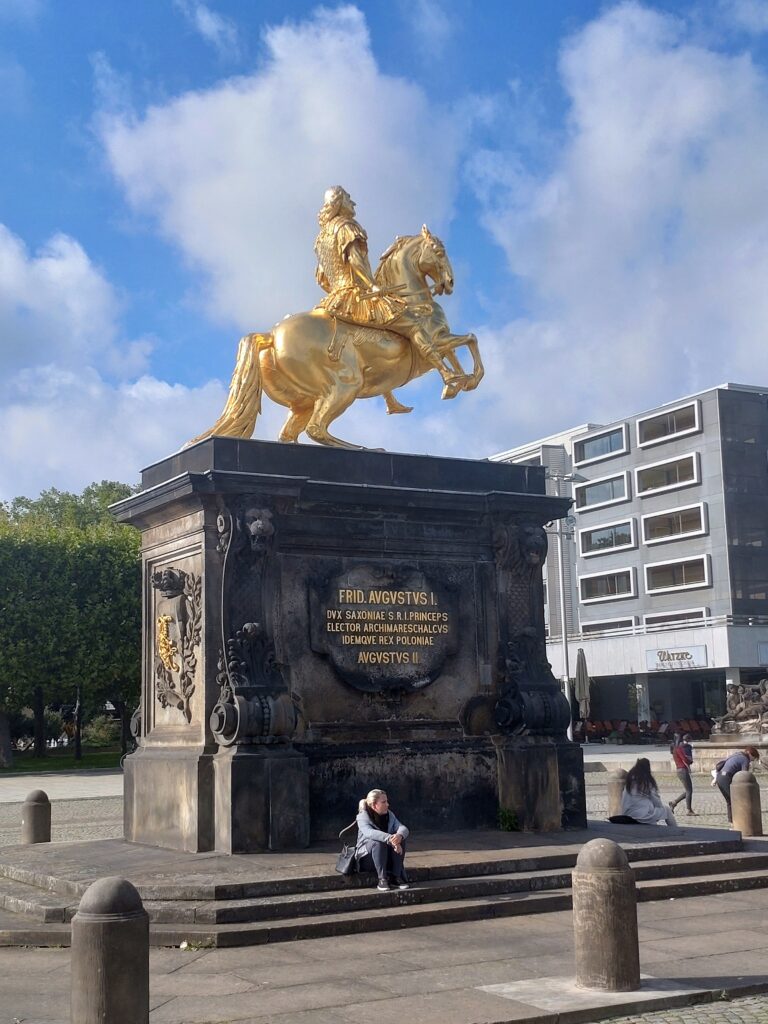Dresden is the landmark for peace; it is an outcry against the futility of any war. And a call to end all ongoing wars as soon as possible. Indeed, this city’s history makes a clear anti-war statement.
Germany’s most beautiful city

Dresden’s nickname is “Elbflorenz” or Florence on the Elbe. It is a beautiful city generously endowed with art and magnificent buildings, much more than you would expect based on what you are used to in other cities. And indeed, with an Italian flair. Via the Augustbrücke, you walk from the Altstadt, with its magnificent churches, Zwinger, Semper, “Grünes Gewölbe” to the Neustadt long ago called Altendresden. “Der Goldener Reiter,” at the beginning of the Hauptstrasse, reminds us of Elector August the Strong, who later became King of Poland.
There is no justification for war
War is only about power and wealth. Or, in men’s terms, “who has the greatest.” Whoever has power wants more, and whoever has wealth wants more. This insatiable attitude has dramatic consequences. It is always about more, never because of better, fairer, or more social; it is only about having more. As always, those who want war find a cause to start it. Once you have decided you want to beat a dog, you will find a stick. Let’s look at history. A reason is quickly found or made. As if this is a justification to put innocent civilians on the run, or worse, to torture, rape, or kill them, destroy entire cities, and destroy infrastructure.
Tchaikovsky’s example
One composition of Tchaikovksy illustrates the nonsense of war. He composed ballet music with such sophistication, subtleties, and grace that everyone knows at least one of the classics (Swan Lake, The Nutcracker, Sleeping Beauty) and recognizes its music. He is someone you don’t think of when it comes to violence, evidenced by his Liturgical Mass (op. 41), who mainly suffered from his internal struggles and did not use violence in the process. On the other hand, he wrote the 1812 Overture to celebrate the military victory over Napoleon. While he no doubt wanted it to sound like an outpouring of joy and freedom, I find this work especially deeply sad. Despite the mocking reference to the French national anthem, you hear the melancholy for the losses and casualties, the fear of the indefinable, and the bombastic sounds that reflect explosions and paralyzing feelings. There is nothing remarkable about it except sadness.
People are on the run
Being constantly on the move myself recently, I have also experienced two types of runaways. On the one hand, the people from Ukraine who fled for their country survived but are still afraid every day of what lies ahead for their homeland, family, and friends. Who sometimes explain their loss, pain, and nightmares. On the other side are people from Russia. Or they are silent men who make an absent-minded impression and are on their way to the next place. Or they are groups of tourists wandering around a free Europe, giving the impression of being (or pretending to be) unaware of the crimes committed in the name of their tsar.
War knows only losers
Back in Dresden, I am walking through the city where the old buildings regained their glory and honor. A town where the former rulers deliberately chose art over arms. A pearl that at the end of World War II was wiped out in a blaze by a massive air raid, depriving thousands of people of their lives and homes but managed to rise like a Phoenix. I remember my first visit to this city 20 years ago and saw how they rebuilt the Liebfrauenkirche like a giant 3-D puzzle. The surrounding square is alive and bustling again as it did before the raid. Now that everything is standing, the city is making an unmistakable gesture. Every war is pointless; innocent people and civilians pay the heaviest price.
Enjoy the music!
PS
It is not my habit, but I can recommend you an ideal base to explore Dresden, namely the Meininger Hotel near the Hauptbahnhof.
